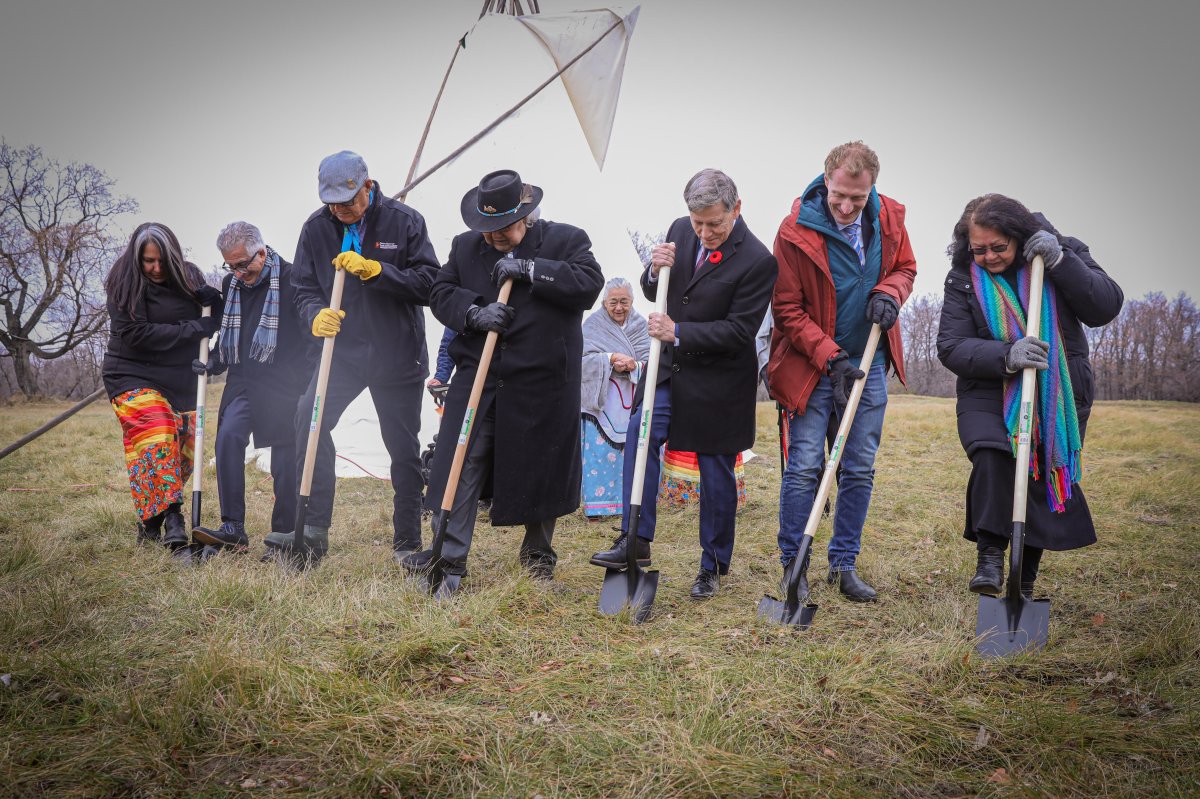This is the second story in a Global News series called Journey Towards Reconciliation. To see previous stories, click here.

George Arcand Jr., the former grand chief of the Confederacy of Treaty 6 First Nations, says more than six months after Pope Francis visited Canada to deliver an apology on his people’s land, contact between First Nations leaders, Ottawa and the church has been almost non-existent.
Ahead of his departure from the role of grand chief, Arcand Jr. sat down to speak to Global News for a television special called Journey Towards Reconciliation.
“I’m really disappointed that Canada and the church are not moving quicker,” he said. “In the First Nation communities, we’ve started to prepare for the battle of dealing with our community members’ challenges.
“We see early that we don’t have the resources or the people to deal with this battle we’re going to have. ”
The First Nation leader said Pope Francis’ visit and the apology for the Catholic Church’s role in residential schools reopened old wounds. His focus for the first wave of the “battle” will be on those who heard the apology and who will feel like they can move ahead now.
“We need the tools to deal with that,” Arcand Jr. said. “There’s going to be an additional wave of those people who are going to see their brother or their sister has gone ahead and dealt with some things and they’re living a much better life — mentally and physically.
“I believe it’s all about creating the infrastructure, and when I say infrastructure, I mean the services required for people to get by.”
In order for that to happen, Arcand Jr. said the federal government needs to restructure some of the ways it deals with First Nations mental health issues, especially when it comes to residential school survivors. He also wants the church to be a part of the process.
“I think we need to get serious and pull together and create the necessary table to begin the discussion,” he said. “We have not.”
Richard Smith, the Archbishop of Edmonton, said the visit and its recoil have been intense.
He said he tried to set up a meeting with the Arcand Jr., but they had not been able to schedule that meeting before new Leonard Standingontheroad was appointed as grand chief.
Smith is looking to set up a meeting with Standingontheroad in the spring.
“The principle behind it is walking together,” he said. “If we are going to move forward, it can’t just be the Archbishop coming up with ideas.
“We still have to guard against the encroachment of the old colonial mindset (of), ‘We know what needs to happen. Let’s go do it. Will you come along?’ No.”
Smith said he has been meeting with parishes in First Nations communities and hopes to speak with other chiefs to let them know the church still wants to engage and work together to figure out what engagement looks like to them.
“I think a lot of us are still trying to get our heads around what happened,” he said. “What would normally have unfolded over a two-year-plus period, was really concentrated in a matter of months.
“(It’s) going to take a long time to digest and sink in… It’s not to say that things have been stagnant, not by any stretch.”
Smith said he has spoken with Indigenous parishioners who have told him they were deeply moved by the papal visit to Canada.
“Before he even said a word, his arrival in the country was the message,” Smith said, referencing Pope Francis’ limited mobility on his trip. “He was in a lot of pain and people realized that this was really important to him… He wanted to be with Indigenous peoples, as he had promised.
“I sense it certainly within myself, and I sense it within others: a real desire, a real enthusiasm not to lose the significance of that moment of the visit and not to lose a sense of how important this relationship is with Indigenous people, not just on the part of the church, but on the part of the whole country, and how do we move it all forward.”
It’s not just about the short-term impacts. Smith said the church is ready for “the long haul,” and not just the enthusiasm immediately following the visit.

The federal government said it has also taken steps forward since the visit.
“The Government of Canada is taking the steps necessary to ensure it continues to do all it can to execute the disclosure of documents, while respecting legislation, court orders, settlements and ongoing litigation processes,” a statement from Crown-Indigenous Relations and Northern Affairs Canada said.
On Jan. 20, 2022, the federal government signed a memorandum of understanding with the National Centre for Truth and Reconciliation, focused on the sharing of historical documents related to residential schools that are in Canada’s possession.
The government says more than four-million documents were previously disclosed by Crown-Indigenous Relations and Northern Affairs Canada and other government departments to the Truth and Reconciliation Commission and those documents were transferred to the NCTR.
There is also an internal review being done on documents that were not disclosed as a part of that process, and on a new structure to “govern document disclosure, and the formation of an interdepartmental committee to facilitate this process.”
“Canada has now shared more than 1.5 million additional documents and higher-quality images with the NCTR, as well as 12 previously unshared or updated school narratives and the full document collection from the Sisters of St. Anne,” the statement said.
The federal government has also provided $1.6 million to assist the disclosure process, “while respecting survivors’ wishes, legislation, court orders, settlement agreements and ongoing litigations.”
The statement also said that the federal government is working with the Catholic Church to facilitate the sharing of their collections.
Arcand Jr. said there is still a long way to go, and in order for people to move on with their lives, they need to feel like they’ve been heard, respected and trusted. They also need to know that the Catholic Church takes responsibility for what happened in the schools it ran.
“I don’t believe that it’s just about money, but I believe the Catholic Church needs to be part of the solution,” he said.
“The papal visit, I think people started to see that there is some sincere sincerity in the Catholic Church wanting to figure out a way to make things better.”
— With files from Erin Chalmers, Global News and Dan Grummett








Comments